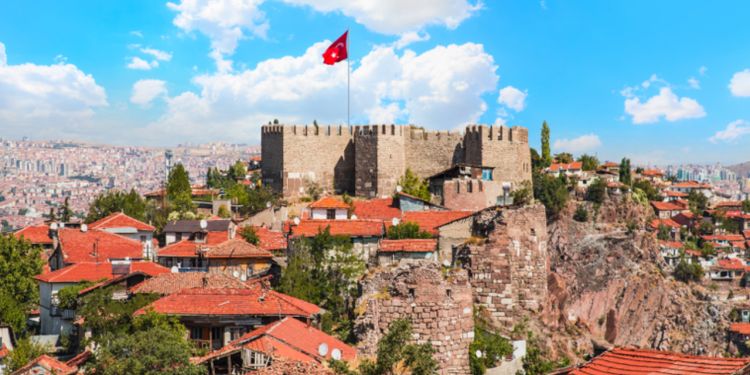Finding a job in Ankara

Ankara is Türkiye's political capital and second-largest city after Istanbul. Modern infrastructure and proximity to the nation's decision-makers make it an attractive option for foreign investors and international companies. When it comes to the expat population, however, Ankara falls substantially behind Istanbul as well as the smaller towns along the Turquoise coast.
This may be something you will want to take into account: fewer expats means less competition and more opportunities to get a job offer. On the other hand, this also places certain limitations on your social and after-work activities. But let's take a closer look.
Ankara is primarily known as a center of power, hosting the headquarters of the Turkish government and its many satellites – ministries and national administration services, public or state-owned organizations, and international institutions such as the International Monetary Fund, the United Nations or the World Bank, to mention a few.
Note that the city is also an important industrial and commercial hub. The OSTIM industrial zone, one of the biggest in the country with almost 50,000 employees, is home to the production units of companies operating in strategic sectors such as defense, aerospace or pharmaceutics.
The Sogutozu business district hosts the headquarters of many international firms employing thousands of service workers.
Located at the heart of agricultural Anatolia, Ankara is also very active in the agribusiness industry. The city's trademark products include Angora wool, honey and wine – with famous appellations such as Kavaklidere or Cankaya – and are largely export-oriented.
Job hunting in Ankara
With the concentration of official institutions, ex-pats with a background in international cooperation, governmental or non-governmental organizations, or lobbying should find a position in the twinkling of an eye.
The foreign embassies and consulates clustered in Ankara also represent a go-to for expats willing to work in administrative services.
Otherwise, for good English speakers, sectors such as the media and arts industries are generally eager to get international perspectives and are open to working in English.
The same can be said of innovative start-ups. Expats interested in pursuing a tech career can try to reach out to local start-ups, many of which can be found in incubators or co-working spaces.
Since Ankara hosts some of the best technical universities of the country, there is always a good chance for a talented programmer and developer to land a decent job in new startups.
Ankara is home to 17 universities, as well as numerous schools and colleges. This opens up opportunities in teaching for qualified and experienced professors in different subjects. You may also look into opportunities in English teaching if you have the relevant degree or are TEFL-certified.
Foreign manpower is always needed in the tourism industry, and a good command of English is always highly valued in the customer service of a hotel or an entertainment facility. Since many foreign diplomats are often visiting the city, the 5-star hotels are always looking for personnel who are fluent in English, Spanish and other languages.
Finally, you will likely be able to work in your native language at the local branch of companies originating from your home country.
Expats specifically looking to make use of their foreign language skills can apply for specific educational positions in the city's many international schools or as au pairs in families.
The importance of networking in Ankara
Regardless of the region, a professional network is generally the most helpful resource to land a job in Türkiye.
Personal connections play an important role in all areas of life in the country, and knowing someone in the field you want to work in can be of immense help in your job search. If you do not have a local network yet, attending professional networking events can significantly increase your chances of meeting the right people. Look out for industry conferences, exhibitions and job fairs in Ankara, which you could attend in person.
Alternatively, be active online. Join online communities, forums and discussions that could connect you with people in your line of work. Good places to start are LinkedIn communities in your field as well as more generally-themed groups and forums such as the Foreigners in Ankara or Ankara Expat Life groups.
LinkedIn is a key tool where you can follow companies based in Ankara, join industry-specific groups, and participate in discussions. This not only helps in networking but also keeps you informed about the latest trends and job openings.
Additionally, leveraging platforms like Twitter can be beneficial. Follow hashtags related to your industry in Ankara, engage with professionals' tweets, and share your own insights. This can increase your visibility and chances of getting noticed by potential employers.
A great way to start your job search and get a general overview of available jobs is to check the job portals specific to Türkiye, like Kariyer.net, Yenibiris.com, and Eleman.net. These websites often list a variety of job openings in different sectors across Ankara.
If you are an experienced professional, it may be worth getting in touch with international or local recruitment agencies, such as Michael Page. They often have connections with local businesses and can help match your skills and experiences with suitable job openings.
If you are a student or alumni, you should definitely make use of the career services at local universities. These centers often have job postings and can provide guidance specific to your field of study.
Finally, if you already have a company in mind that you think would benefit from having you as an employee, you can contact them directly. A good way to do that is by studying the company's website and social media pages: check available offers, read into the company's values and mission, and see what communication style the company uses. Next, try to craft an application specifically for this employer, keeping all of the above in mind. You can then send in your application to the company's HR manager or reach out to the company on LinkedIn.
Last but not least, while this is not a direct job search method, improving your Turkish language skills can significantly enhance your employability and job prospects, especially in Ankara. There are lots of Turkish courses available online. But you could also enroll in an offline language program in Ankara. This would give you the opportunity to explore the city, make connections, and practice Turkish in a real-life environment.
How to apply for a job in Ankara
To apply for a job in Ankara, you will need a CV and a cover letter. If you are applying for a position with an international company, having your CV and cover letter in English may be enough. However, when applying to a local company, having them translated into Turkish may have a substantial advantage.
As you prepare your application, make sure to pay close attention to the job requirements listed in the posting. It's always a good idea to tailor your application specifically to the job you are applying for.
Some positions might require proficiency in Turkish, while others, particularly in multinational companies, may operate primarily in English.
Once your application is ready, there are several ways you can send it in:
As we've mentioned above, networking remains an essential part of job hunting in Türkiye. If you have a professional network in Ankara or access to industry events, these would be the best options for getting your application into the right hands.
If you don't yet have a network, you can use more traditional channels to submit your resume and cover letter.
You can apply through the company's website by getting the contact details from their career pages or using the built-in online application systems. You can also respond to matching job offers online or reach out to companies on Linkedin with your application.
Job interviews in Türkiye
If your application receives a response, you may need to start preparing for an interview. Research the company thoroughly and be ready to discuss your experience and how it relates to the job. Understanding some basics of Turkish business culture can also be beneficial. Let's look into this in a bit more detail.
In Türkiye, business is often built on strong personal relationships. Trust and mutual respect are paramount, and it's common for business relationships to develop through face-to-face meetings and social interactions. This is why your first interview with your potential employer is a great opportunity to showcase your personal qualities.
Meetings generally start with a casual conversation as a way to build rapport. It's advisable to engage in this small talk before getting down to business. Punctuality is appreciated, but meetings may not always start on time and can be longer than expected.
Using titles and surnames is common until a closer relationship is established. Addressing someone by their first name in the initial interactions may be seen as disrespectful.
Dressing well is important in Türkiye. Business attire tends to be formal, with suits and ties for men and conservative, professional attire for women. Note that, in some cases, it may be better for women to choose a modest and less revealing outfit for a job interview — especially for an official position.
Respect for hierarchy is significant in Turkish business culture. Decisions are usually made by senior-level management. It's important to recognize and respect this structure in interactions and meetings.
While many Turkish business people speak English, especially in larger companies and urban areas, knowing some basic Turkish phrases can be advantageous and is seen as a sign of respect and commitment.
Legal aspects of getting a job in Ankara
The most critical legal aspect of getting a job in Ankara as an expat is obtaining a work permit. Türkiye has specific regulations regarding work permits, and they are generally employer-specific. This means that the employer must apply for the permit on behalf of the employee. The process involves submitting various documents, including a job offer from a Turkish employer and relevant qualifications. It's important to note that work permits also act as residency permits. The Ministry of Labor and Social Security is the primary authority for issuing these permits, and the process typically takes around 30 days.
When you secure a job, you will enter into an employment contract. In Türkiye, employment contracts must be in compliance with the Turkish Labor Law. These contracts should clearly outline the job description, salary, working hours, entitlements like annual leave, and conditions for termination. It is advisable to have a professional or legal expert review your contract before signing to ensure that all terms are fair and legal.
Under Turkish law, all employees, including foreign workers, are required to be registered with the Social Security Institution (SGK). This registration provides access to healthcare services and pensions. Employers are responsible for registering their employees with SGK and for making social security contributions. As an employee, you should make sure that these registrations are in place so that you can access social security benefits in the country.
Understanding the Turkish taxation system is another important consideration when being employed in a foreign country. In Türkiye, income tax is deducted at source by employers. The tax rate depends on your income level. You will be subject to income tax for the income that you receive in Türkiye. Familiarizing yourself with the tax brackets and deductions can help in financial planning.
Important:
Make sure to look into how receiving income in Türkiye reflects on your tax obligations in your home country.
Good to know:
The standard working week in Türkiye is 45 hours, and any work beyond this is considered overtime, which should be compensated accordingly. Employees are also entitled to annual paid leave, the duration of which depends on the length of service.








